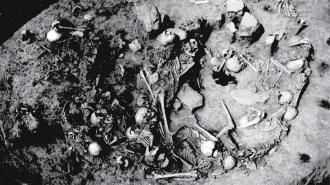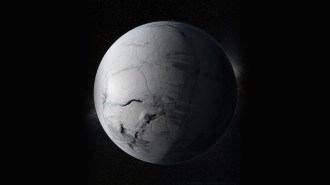All Stories
-
 Archaeology
ArchaeologyIron Age mass grave may hold unusual victims: mostly women and children
A land dispute may have led to the massacre 3,000 years ago, suggesting Europe’s transition to farming wasn’t always peaceful.
By Tom Metcalfe -
 Genetics
GeneticsWanderlust may be written in our DNA
A new study suggests that inherited traits explain a small but measurable share of why some people relocate far from where they were born.
By Elie Dolgin -
 Health & Medicine
Health & MedicineThis itch-triggering protein also sends signals to stop scratching
The TRPV4 protein’s dual nature, found in studies with mice, may complicate the hunt for human itch treatments
-

Finding the story
Editor in Chief Nancy Shute discusses how our reporters find unique stories, from vaccine beer to a particle collider’s retirement to the rise of AI scientists.
By Nancy Shute -
 Health & Medicine
Health & MedicineMeds like Ozempic could ease arthritis
A study in mice and people with osteoarthritis suggests semaglutide can bulk up cartilage between bones, though bigger trials are needed to confirm.
By Meghan Rosen -
 Science & Society
Science & SocietyProject Hail Mary made us wonder how to survive a trip to interstellar space
We can take some clues from hibernation and cryogenics, but humans aren't yet built for that kind of deep sleep.
-
 Climate
ClimateHalting irreversible changes to Antarctica depends on choices made today
Antarctic Peninsula projections show accelerating ice loss, warming oceans and global sea level impacts tied to greenhouse gas emissions.
-
 Chemistry
ChemistryMachine learning streamlines the complexities of making better proteins
The framework predicts how proteins will function with several interacting mutations and finds combinations that work well together.
By Skyler Ware -
 Climate
ClimateSnowball Earth might have had a dynamic climate and open seas
Sediments from Scotland hint that ocean-atmosphere interactions continued more than 600 million years ago despite widespread ice.
-
 Paleontology
PaleontologyA mouth built for efficiency may have helped the earliest bird fly
A flexible tongue, sensitive beak and teethlike cones in the mouth may have helped Archaeopteryx generate enough energy to fly.
By Jay Bennett -
 Health & Medicine
Health & MedicineHome HPV tests won’t replace the ob-gyn
Breast exams, birth control and family planning are just some of the reasons not to skip your annual ob-gyn appointment.
-
 Animals
AnimalsSome dog breeds carry a higher risk of breathing problems
Research reveals more short-snouted dogs besides pugs and bulldogs that struggle with breathing. Pekingese and Japanese Chins topped the study's list.
By Jake Buehler